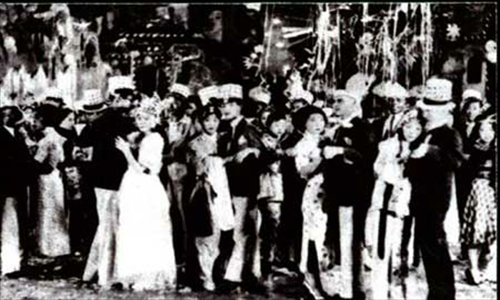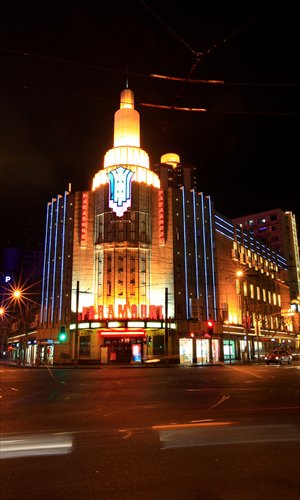The joint was jumping

Jazz is hitting the right notes again in Shanghai after a turbulent history in the city. This is well demonstrated with the return of the annual JZ Festival which attracts leading jazz musicians from around the world. The ninth JZ festival is coming to a triumphant conclusion this week after fans and musicians enjoyed a vast variety of high quality music in major venues throughout the city .
"Certainly foreign jazz masters are increasingly looking forward to coming to China. And the JZ Festival attracts them with its highly professional approach and its spreading influence," Ren Yuqing, the founder of the JZ Festival, told the Global Times.
While Shanghai has seen its jazz scene blooming with the emergence of local jazz artists as well as the establishment of new live jazz music venues over the past few decades, the history of this music genre in Shanghai goes back to the turn of the 20th century.
Jazz was first introduced to China during the Westernization Movement (1861-94), a nationwide campaign intended to enhance the country's future by learning from its Western counterparts and developing cultural, military, economic and scientific advancements.
In the cultural advancement encouraged by the movement in the following years, classical music and jazz were regarded as two of the most significant forms of that time in China. Jazz arrived in the international settlements of Shanghai, alongside other fads and fashions, and soon gained great popularity among the city's middle and upper class.

The center
Shanghai became China's uncontested center of jazz in the boisterous 1920s and 1930s, when some 500 jazz bands, mainly composed of Filipino and Russian musicians, could be found playing at nightclubs and dance halls.
The foreign domination of jazz bands in Shanghai wasn't broken until 1934 when the acclaimed Chinese composer Li Jinhui (often referred to as the father of pop music in China and whose student Nie Er later wrote the national anthem of the People's Republic of China) was ordered to form an all-Chinese jazz band by the notorious gangster Du Yuesheng (Big-Eared Du), one of the three leaders of the city's infamous Green Gang Triad.
Called the Clear Wind Dance Band and proudly hailed as the country's first all-Chinese jazz ensemble, the band played at the then Yangtze River Dance Hall (today's The Yangtze Boutique Hotel Shanghai on Hankou Road near People's Square).
Li was a dedicated composer who promoted nationalism by encouraging education and composing a string of patriotic songs. For the band Li emphasized Chinese qualities and characteristics in terms of the band's makeup and its musical styles.
He selected a group of musicians from North China, all of whom were not only musically adept but were also tall and good looking young men - which distinguished them immediately from the other bands in the city.
As well as composing music for the Clear Wind Dance Band, Li wrote songs for female vocalists who performed them with the band. But this act in itself drew a good deal of public criticism -having male and female performers on stage together was considered decadent and debauched by many and accordingly, Li and his Chinese jazz musicians attracted condemnation from many quarters. But things moved quickly in those days and this band soon found itself left in the shadows with the establishment of the Paramount Ballroom's big band.
Dazzling lights, vibrant music, elegant young men and beautiful women sheathed in sexy qipao were the trademarks of Paramount Ballroom during the 1930s. Standing at the intersection of Yuyuan Road and Wanhangdu Road in busy Jing'an district, the Paramount was the swankiest ballroom and nightclub in the Far East before the country's liberation in 1949.
A symbol of the roaring prewar Shanghai, the Paramount (in Chinese it is known as Bai Le Men - the Gate of 100 Pleasures) was built in 1932 by a Chinese merchant Gu Liancheng as a casino and it cost 700,000 silver taels. Designed by the Chinese architect Yang Ximiao, the façade of the Paramount was pure art deco, the most fashionable style of the 1930s.
The three-story building featured the most advanced facilities of the time, including the distinctive glass-floored Golden Flow dance hall, a sprung dance floor and air conditioning along with the city's hottest dancers and jazz bands.
In its heyday, the Paramount was the place for the glitterati to socialize and entertain. It attracted foreign celebrities as well as Shanghai's social set and VIPs. During his brief visit to the city in 1936 Charlie Chapin dropped in with his wife; Anna Chennault and General Claire L. Chennault, of the US Army Air Corps in China and the Flying Tigers fame, had their engagement party there.

A Chinese band
Behind the glitter and glamor though the Paramount bosses became dissatisfied with their resident bands of Filipino musicians, and talked about them being sloppy and lazy. The bosses elected to create the ballroom's own jazz band. In 1947, the Paramount's very first all-Chinese jazz band skipped on stage to be led by Jimmy King, one of the most admired jazz musicians of the day in Shanghai.
The big band, a reflection of America's swing bands like those of Duke Ellington, Count Basie, Louis Armstrong and Glenn Miller, performed with soloists and female vocalists. Vocal stars of the day included film stars and songstress Zhou Xuan, Wu Yingyin, one of China's top seven singers, and Li Xianglan, the Japanese star born and raised in China known in the West as Shirley Yamaguchi.
But like many of the stately buildings in Shanghai, the Paramount declined after the founding of new China, and Jimmy King's big band broke up when the dance halls in Shanghai were shut down in the early 1950s. Then the once vibrant Paramount was turned into a cinema called the Red Capital which screened propaganda films.
Years of thoughtless renovations and unnecessary additions meant that after being a vital part of the city's glamorous nightlife, most of the building's charm and appeal had been destroyed 80 years later.
But the public's attitude towards history and fine architecture changed. In September 2001, a Taiwanese businessman invested some 25 million yuan ($4 million) to initiate a restoration project to resurrect the ballroom's glamor and recreate the experience of the jazz era in modern Shanghai.
More recently the Jing'an government has introduced a new refurbishment plan for the Paramount, intending to establish it as a jazz center for Shanghai.
The flourishing jazz scene in Shanghai between the 1920s and mid-1940s also attracted a large number of professional songwriters working for the country's movie and entertainment industries. The songwriters included Chen Gexin ("Rose, Rose, I Love You"), Yao Min ("Lei Mengna"), Li Jinguang ("Shangri-La"), and Lin Mu ("In the Mood for Love").
While these classy melodies were heard and enjoyed by the upper and middle classes in Shanghai, jazz remained a largely inaccessible foreign genre for most of the ordinary people in the city.
Given the public's limited understanding of jazz and the fact that jazz was usually associated with clubs and ballrooms, alcohol, gambling, drugs and prostitution, the music was generally considered vulgar and decadent.
After the founding of the People's Republic of China in 1949, jazz faded from the scene, regressing into a mostly underground form of music. During the Cultural Revolution (1966-76) jazz was banned completely.
Jazz would not be heard in public in Shanghai again until the early 1980s when the Old Jazz Band took to the stage at the Jazz Bar at the Fairmont Peace Hotel (the former Cathay Hotel) on Nanjing Road East.
The Old Jazz Band was formed in 1980 by six veteran musicians, some of whom had been members of the Paramount's Chinese big band. Based on much of their repertoire from the Paramount the band specialized in jazz classics of the 1920s and 1930s winning acclaim far and wide.

An appealing blend
Their blend of jazz and nostalgia became so appealing that the band has constantly attracted enthusiastic audiences, local fans, tourists, celebrities and even visiting heads of state, including former US presidents Jimmy Carter and Ronald Reagan.
The popularity of the Old Jazz Band has helped rejuvenate the Shanghai's jazz scene and has also attracted much overseas media attention with a slew of foreign journalists flying in to write about and interview the members of the band. In 1996, Fairmont Peace Hotel's Jazz Bar, with its Old Jazz Band, was ranked as one of the world's top clubs by the American magazine, the Newsweek. The band has also been invited to perform in Japan, Singapore, Canada and the US.
The now restored Jazz Bar at Fairmont Peace Hotel remains one of the best places in Shanghai to savor classic jazz in the style it used to be enjoyed.
Compiled by Yang Zhenqi